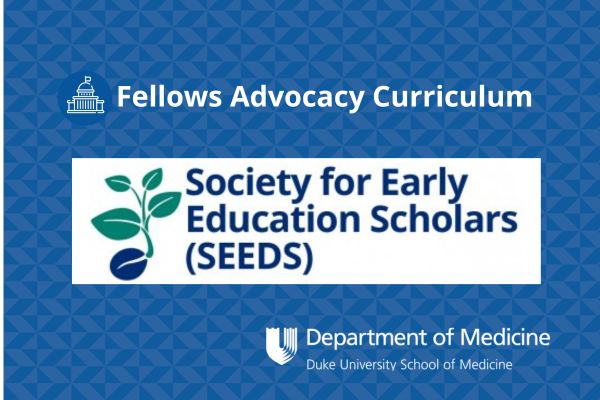
Duke Department of Medicine fellowship programs offer outstanding medical training for physicians interested in focusing their skills in several subspecialties while trainee career development initiatives augment the learning experiences for all.
Whether planning a career focused on discovery, education, clinical practice, administration, informatics or other areas, programs like the Fellows Advocacy Curriculum (FAC) and the Society for Early Education Scholars (SEEDS) bring together fellows with a shared passion for medicine and gives them the opportunity to gain the skills necessary to lead, teach, and inspire.
“This year’s cohort was smaller than normal which allowed for much more one-on-one time with the SEEDS fellows,” said SEEDS Director Dr. Matt Sparks. “Next year will be our biggest class ever and, because of this, we are working to recruit more faculty to be involved in mentoring the SEEDS fellows.”
The 2024-2025 FAC cohort was comprised of eight fellows from five different programs with a wide variety of advocacy interests ranging from gender-affirming care to menopause care, to access to long-term care for older adults. When it came to choosing a group advocacy platform to present to federal legislative staffers, Director Dr. Caroline Sloan was concerned that this year’s cohort would have a difficult time choosing a topic they could all support.
“In the end, it was easy,” she said. “Their passion for improving access to care for underserved patients prevailed – they decided to advocate against cuts to Medicaid in the federal budget. They each had personal and specialty-specific angles to the issue, which led to a strong advocacy pitch and very productive meetings on both sides of the aisle.”
The first two years of the FAC program were heavily concentrated on federal government. That will still be the case, Dr. Sloan added, but the incoming cohort we will round out its experience with a session on North Carolina state government. Fellows will hear from N.C. Health Director and Professor Emeritus of Medicine Larry Greenblatt as well as a member of the N.C. General Assembly.
Read more about these two programs and the experiences of fellows in each cohort for the 2024-2025 year.
Society for Early Education Scholars (SEEDS)
SEEDS brings together fellows from across all divisions within the Department of Medicine who share a passion for medical education, giving trainees the opportunity to gain the skills necessary to lead, teach, and inspire the next generation of physicians.
SEEDS transforms enthusiasm for teaching into a meaningful scholarly path. Through a monthly seminar series and hands-on teaching workshops designed to build expertise in medical education, SEEDS connects fellows with dedicated faculty mentors and fosters a vibrant community of peers across subspecialties.
The 2024-2025 SEEDS cohort includes Drs. Matthew Goodwin (Infectious Diseases), Jordan Infield (Hematology and Oncology), Randol Kennedy (Endocrinology), Melvin Larker (Pulmonary and Critical Care), Aruna Phekoo (Nephrology), Mike Turk, (Nephrology), and Palavi Vaidya (Nephrology).
Trainees Drs. Randol Kennedy and Aruna Phekoo share their biggest takeaways from the year, and how they will use this specialized training moving forward.
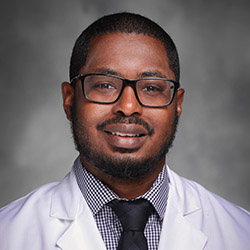
Randol Kennedy, MD
Clinical Fellow
“One of the things that drew me to do fellowship training at Duke was its emphasis in training future leaders in medical education through the SEEDS/FACT program. My experience was certainly a fruitful one. I have been enriched with a deeper knowledge on topics surrounding presentation techniques, framework for curriculum building as well as scholarly work in medical education I found the teaching opportunities with the residents a great way to put our presentation skills into practice, with great feedback on how to further improve on our presentation style and slide preparation.
What was a plus for me was being paired with a mentor who I also utilized to give me sound advice on interviewing for jobs as well as contract negotiation. Finally, I found this to be a great springboard to connect with mentors in the field that can guide me towards improving on gaps on my academic CV, and build a stronger platform towards future promotion in my career path.”
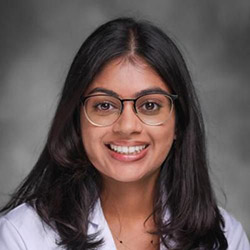
Aruna Phekoo, MD
Chief Nephrology Fellow, 2024-2025
“I’m incredibly grateful for the SEEDS program, which has played a major role in shaping both my skills and my vision for the future as a clinician-educator and leader.
Before SEEDS, most of my teaching was informal, but the program provided the structure, tools, and mentorship I needed to approach teaching with greater confidence and intention. I learned how to adapt my teaching style depending on the setting — whether at the bedside, during chalk talks, or in formal lectures — and how to incorporate technology in ways that truly enhance learning. The sessions on feedback, remediation, and navigating tough conversations were especially helpful, giving me practical tools to support trainees through both challenges and successes.
SEEDS also emphasized leadership and the importance of creating inclusive and supportive learning environments. The upstander training helped me feel better equipped to recognize and address bias when it arises.
The mentorship I received from faculty across different fields was another highlight, and I know I’ll continue to draw on these relationships throughout my career. Overall, SEEDS strengthened my commitment not only to teaching, but to leading with integrity and creating meaningful, effective learning experiences for my future trainees.”
Fellows Advocacy Curriculum
The Fellows Advocacy Curriculum (FAC) is an elective track for subspecialty fellows who have an interest in health policy and advocacy. Through collaboration with the Duke Government Relations Office, fellows develop and present their own advocacy platform to legislators and legislative aides in Washington, D.C. and Raleigh.
The 2024-25 fellows cohort includes Drs. Athavi Jeevananthan (Endocrinology, Metabolism, and Nutrition), Ryan Kane-General (Internal Medicine), Emily Niehaus (Infectious Diseases), Haley Cunningham (Infectious Diseases), Lana Abusalem (Infectious Diseases), Lior Abramson (Geriatrics and Palliative Care), Nicole Dussault (Hospice and Palliative Care), and Will Woodhouse (Infectious Diseases).
Drs. Cunningham, Abramson and Woodhouse share their perspectives on the year.
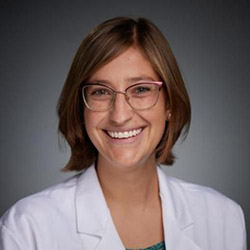
Hayley Cunningham, MD
Duke Infectious Diseases Fellow
“The Fellows Advocacy Curriculum equipped me with the knowledge and support I needed to feel empowered to advocate. One of the most important lessons I learned is the importance of tailoring the message and the "ask" to the person I am advocating to. While I am passionate about caring for all patients and advocating for the most vulnerable (who are often the most stigmatized), to be effective requires appealing to what is most important to the listener. This was a big shift in perspective for me that I will utilize in my local advocacy work.
As co-chair of the Coalition to End the HIV Epidemic in Durham, I am currently advocating at the city and county level to improve utilization of federal funding for HIV housing and supportive services. I plan to continue advocating for those living with HIV throughout my career.”
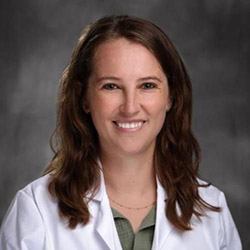
Lior Abramson
Fellow, Geriatrics and Palliative Care
“When I applied for the FAC last summer, I had never engaged in advocacy as a physician before. The FAC curriculum provided me with a foundational knowledge of how health policy is made and what health policy issues have the most potential to impact our patients and how we deliver care. Engaging in advocacy on an issue that effects the people I care for was empowering.
My biggest takeaway was that even in this early stage of my career, I already have the experience and the knowledge to give a voice to the impact that policies have on patients’ lives. As a geriatrician who will be working in post-acute and long-term care, I am certain that the health policy landscape will be extremely important to my patients.
Upon leaving fellowship, I plan to engage with my national professional organization to continue being informed of advocacy priorities. I anticipate that policy changes regarding nursing home regulations will be an issue where my advocacy as a physician will be important to ensure patient care and safety are prioritized.”
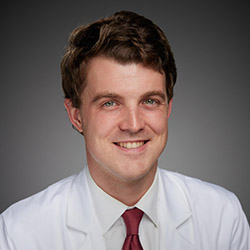
Will Woodhouse, MD
Fellow, Infectious Diseases
"Participating in the Fellows Advocacy Curriculum (FAC) was a highlight of my Infectious Diseases Fellowship at Duke. This yearlong program provided invaluable training in health policy, connected me with national policy leaders, and taught me how to advocate effectively on critical health issues. When threats to Medicaid surfaced, we recognized the potential impact on vulnerable patients and felt compelled to act.
The FAC equipped us with skills to engage with our Government Relations team, interact with lawmakers, and advocate directly on Capitol Hill. The most important lesson I learned was the power of telling our patients' stories to drive change. As I transition to faculty at Duke, I aim to continue advocating for our patients by bringing their voices to policymakers and championing meaningful reforms."